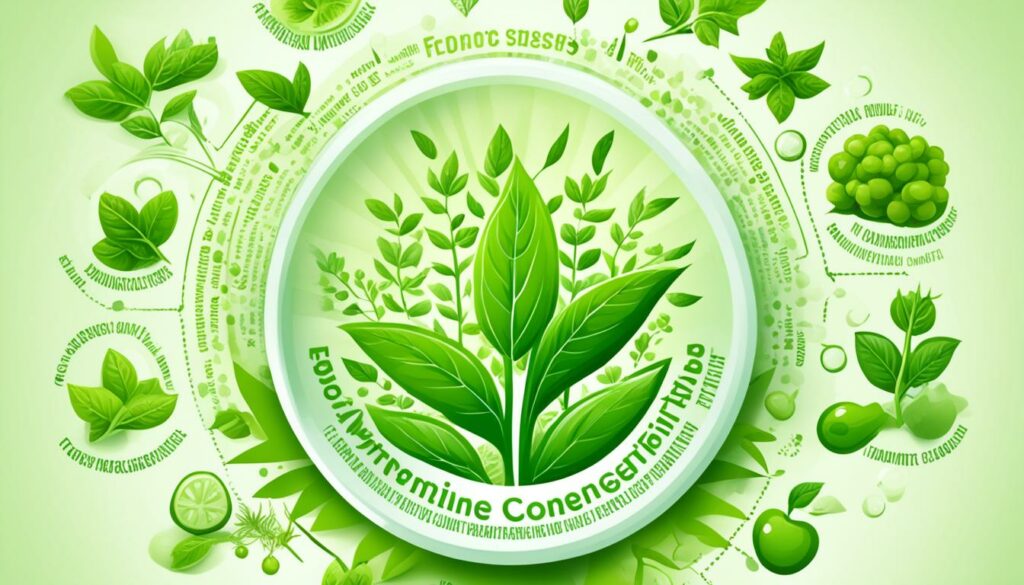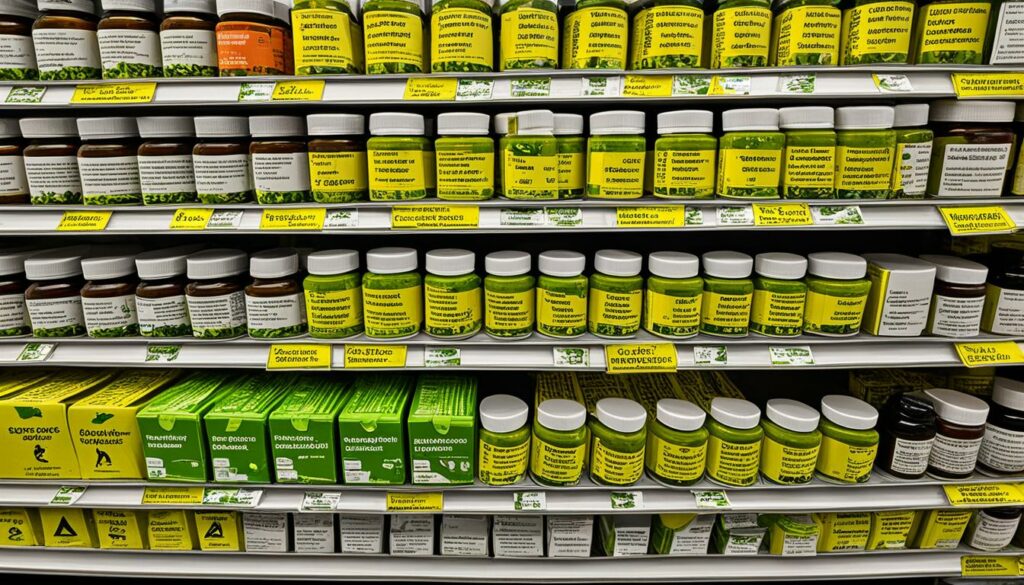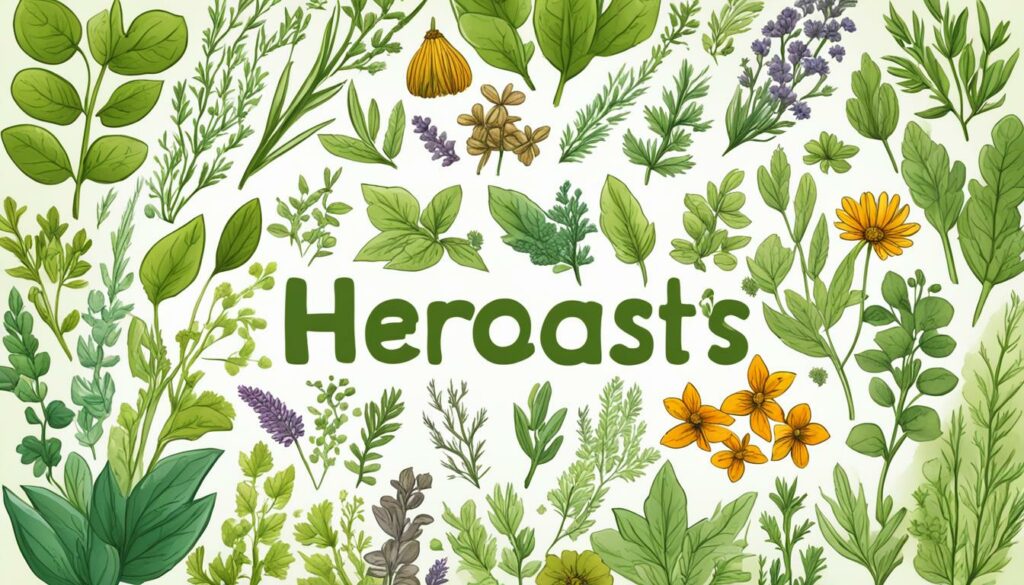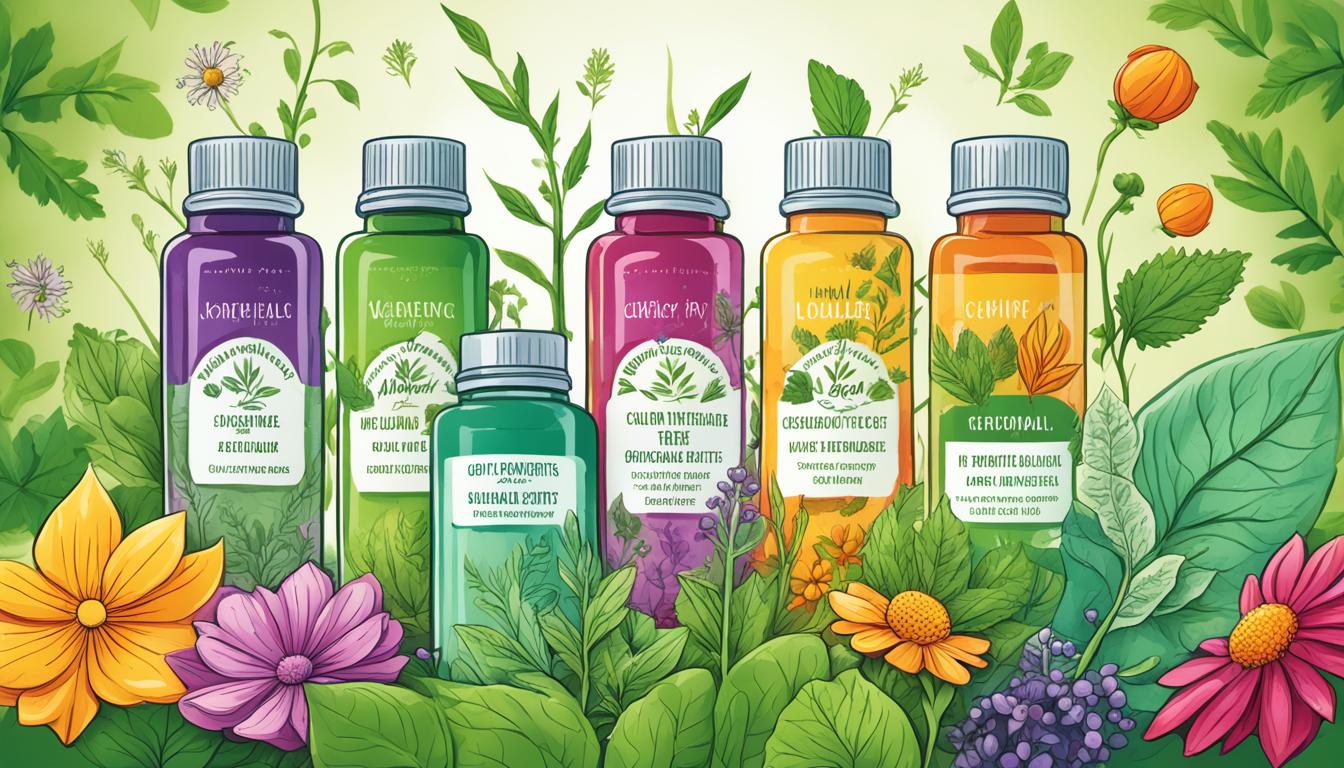Are you curious about the power of natural remedies? Have you ever wondered how plant-based medicine can support your well-being? Discover the extraordinary world of herbal extracts and embark on a journey towards holistic health and vitality.
In a world where people are increasingly seeking organic solutions, herbal extracts have emerged as a popular choice for those looking to enhance their wellness naturally. With their long-standing history in traditional medicine and a booming industry worth around $60 billion annually, these organic herbal supplements are capturing the attention of health enthusiasts worldwide.
Join us as we delve into the myriad benefits of herbal extracts and explore how they can significantly contribute to your natural well-being. From relieving common ailments to promoting overall vitality, discover the immense potential of plant-based medicine in an era where taking charge of your health has become a priority.
The World’s Most Popular Herbal Medicines
When it comes to herbal remedies and natural healing, there are several medicinal herbs that have gained global popularity. These herbal medicines have been used for centuries to address various health concerns and promote overall well-being. Let’s explore some of the world’s most popular herbal medicines:
- Echinacea: This herbal medicine is commonly used to treat and prevent the common cold. It is believed to stimulate the immune system and reduce the severity and duration of cold symptoms.
- Ginseng: Known for its remarkable health benefits, ginseng is used to boost immunity, enhance brain function, and increase energy levels. It is highly regarded for its adaptogenic properties.
- Ginkgo biloba: Traditionally used in herbal healing, ginkgo biloba is known for its cognitive benefits. It is believed to improve memory, concentration, and overall brain health. Additionally, it is used to support heart health and manage dementia.
- Elderberry: This herbal medicine has gained recognition for its immune-boosting properties. Elderberry is commonly used to relieve symptoms associated with the flu and common cold, such as cough, congestion, and sore throat.
- St. John’s wort: Widely used to treat mild to moderate depression, St. John’s wort is a popular herbal remedy. It is thought to work by increasing serotonin levels in the brain, which has a positive impact on mood.
- Turmeric: Known for its vibrant yellow color and distinct flavor, turmeric is a powerful herbal medicine with potent anti-inflammatory properties. It is widely used to manage pain, reduce inflammation, and support overall well-being.
- Ginger: Commonly used as a digestive aid, ginger is known for its ability to treat nausea and promote healthy digestion. It also possesses anti-inflammatory properties that can help alleviate pain and reduce inflammation.
These herbal medicines have stood the test of time and continue to be widely used for their potential health benefits. Whether you’re looking to boost your immunity, support cognitive function, or simply enhance your well-being, these herbal remedies offer natural alternatives to conventional medicines.
| Herbal Medicine | Common Uses |
|---|---|
| Echinacea | Treating and preventing the common cold |
| Ginseng | Boosting immunity, enhancing brain function, increasing energy levels |
| Ginkgo biloba | Supporting heart health, managing dementia, improving cognitive function |
| Elderberry | Relieving symptoms associated with the flu and common cold |
| St. John’s wort | Treating mild to moderate depression |
| Turmeric | Managing pain, reducing inflammation, supporting overall well-being |
| Ginger | Treating nausea, promoting healthy digestion, reducing inflammation |
Remember, while herbal medicines can offer potential benefits, it’s always important to consult with a healthcare professional before incorporating them into your wellness routine. They can provide guidance on dosage, potential interactions, and ensure herbal remedies are suitable for your specific health needs.

What are Herbal Supplements?
Herbal supplements are botanical products made from plants that are used to treat diseases or maintain health. They are derived from various parts of plants, including leaves, stems, flowers, and roots, and are prepared through processes such as extraction, drying, or fermentation. Herbal supplements have been used for centuries in traditional medicine and are valued for their natural healing properties.
These supplements come in various forms, including capsules, powders, teas, or topicals, providing flexibility in how they can be consumed or applied. They can be used internally to support internal systems or externally for the treatment of skin conditions. The versatility and accessibility of herbal supplements make them appealing to individuals seeking natural alternatives to traditional medications.
However, unlike prescription drugs, herbal supplements are not subject to the same testing, manufacturing, and labeling standards and regulations. This means that their safety, efficacy, and quality are not regulated by the U.S. Food and Drug Administration (FDA). Therefore, it is crucial to exercise caution and consult with a healthcare professional before incorporating herbal supplements into your regimen.
When considering herbal supplements, it is important to research reputable brands and manufacturers that adhere to good manufacturing practices. Look for products that provide clear and accurate information about their ingredients, dosage recommendations, and potential side effects. Working with a healthcare professional, such as a naturopathic doctor or herbalist, can provide guidance in selecting suitable herbal supplements and determining the appropriate dosage.

While herbal supplements offer the potential for natural and holistic wellness, it is essential to maintain an informed and responsible approach to their use. Understanding the potential benefits and risks associated with herbal supplements empowers individuals to make informed decisions about their health and well-being.
The FDA and Herbal Supplements
When it comes to herbal supplements, the FDA categorizes them as foods rather than drugs. As a result, they are subject to different regulations and standards. Unlike drugs, herbal supplements are not required to undergo clinical trials or adhere to strict manufacturing standards. Manufacturers of herbal supplements are not required to prove the safety or efficacy of their products before they are sold to the public.
This lack of regulation means that herbal supplement labels cannot make specific claims about treating medical conditions, and there is also no requirement for standardization. This can make it challenging for consumers to know exactly what they are getting when purchasing herbal supplements.
While herbal supplements may offer natural alternatives for improving health and wellness, it is crucial to approach them with caution. It is essential to educate yourself about the herbs you are taking, understand potential side effects and interactions, and work with a trained healthcare professional.
Always keep in mind that just because a product is labeled as “natural” does not guarantee its safety. It’s important to be vigilant and pay attention to any potential side effects or allergic reactions that may occur when using herbal supplements. Your healthcare provider can help guide you in making informed decisions and ensure that any interactions with other medications are taken into account.
Herbal Supplement Regulations and the FDA
“While herbal supplements are not subject to FDA regulations like drugs, it is crucial for consumers to be aware of their potential risks and benefits. The lack of standardized manufacturing practices and clinical trials means that individuals need to exercise caution and research thoroughly before using herbal supplements as part of their wellness routine.” – Dr. Sarah Thompson, MD
It’s important to note that some manufacturers voluntarily follow certain manufacturing standards, such as Good Manufacturing Practices (GMPs), even though they are not required to do so. These manufacturers strive to ensure consistent quality and safety in their herbal supplements.
| FDA and Herbal Supplements | Key Points |
|---|---|
| Regulation | Herbal supplements are categorized as foods, not drugs, by the FDA. |
| Clinical Trials | Unlike drugs, herbal supplements are not required to undergo clinical trials. |
| Manufacturing Standards | There are no standardized manufacturing requirements for herbal supplements. |
| Label Claims | Herbal supplement labels cannot make specific claims about treating medical conditions. |
| Caution and Consultation | It is important to be cautious, educate yourself, and consult with a trained healthcare professional before using herbal supplements. |

Precautions when Choosing Herbal Supplements
When incorporating herbal supplements into your health routine, it is vital to take certain precautions to ensure their safety and effectiveness. Here are some important factors to consider:
- Talk to your doctor: Before starting any herbal supplement, it is crucial to consult with a healthcare professional, especially if you are currently taking other medications. They can provide valuable guidance and help you avoid any potential interactions or adverse effects.
- Educate yourself: Take the time to research and educate yourself about the specific herbs you are considering. Understand their medicinal properties, potential benefits, and possible side effects. This knowledge will enable you to make informed decisions and choose the supplements that align with your individual needs and health goals.
- Follow recommended dosage: Carefully read the label instructions and follow the recommended dosage guidelines. Taking too little may not yield the desired results, while taking too much can lead to adverse reactions. Stick to the suggested dosage for optimal safety and efficacy.
- Beware of interactions: Some herbal supplements can interact with prescription medications, over-the-counter drugs, or other herbal supplements. These interactions can reduce the effectiveness of certain medications or cause unwanted side effects. Always disclose all the supplements you are taking to your healthcare provider to identify potential interactions.
- Monitor for side effects: Pay attention to any changes or reactions in your body when starting a new herbal supplement. Some herbs may cause allergies or side effects, such as digestive issues, headaches, or skin rashes. If you experience any unusual symptoms, discontinue use and consult your healthcare provider.
- Choose reputable manufacturers: When purchasing herbal supplements, opt for trusted brands that prioritize quality, safety, and transparency. Look for manufacturers that provide clear and accurate information about their products, including sourcing, manufacturing processes, and third-party testing.
- Work with trained professionals: Consider seeking guidance from trained and licensed herbalists or naturopathic doctors. These professionals can provide personalized recommendations, dosage adjustments, and help you navigate the complexities of herbal medicine.
By taking these precautions, you can maximize the benefits of herbal supplements while minimizing risks and ensuring your overall well-being.

| Herb | Main Uses | Side Effects |
|---|---|---|
| Echinacea | Boosts immune system | Mild upset stomach |
| St. John’s Wort | Treats mild to moderate depression | Photosensitivity, interactions with antidepressants |
| Ginkgo Biloba | Improves memory and cognitive function | Blood thinning, interactions with anticoagulants |
| Ginseng | Boosts energy levels, improves focus | Insomnia, high blood pressure |
| Turmeric | Anti-inflammatory, antioxidant | Stomach upset, interactions with blood thinners |
Common Herbal Supplements and Their Uses
Herbal supplements have gained popularity for their various health benefits and natural healing properties. Here are some common herbal supplements and their specific uses:
| Herbal Supplement | Uses |
|---|---|
| Black Cohosh | Used for menopausal conditions |
| Echinacea | Strengthens the immune system, prevents and treats the common cold |
| Evening Primrose | Supports hormonal balance, relieves premenstrual symptoms |
| Feverfew | Reduces migraine and headache symptoms |
| Garlic | Supports cardiovascular health, promotes healthy cholesterol levels |
| Gingko Biloba | Improves cognitive function, enhances memory and concentration |
| Ginseng | Increases energy, boosts vitality, supports adrenal health |
| Goldenseal | Acts as a natural antibiotic, supports immune health |
| Green Tea | Rich in antioxidants, promotes weight loss, supports heart health |
| Hawthorn | Supports cardiovascular health, regulates blood pressure |
| Saw Palmetto | Used for prostate health, supports urinary function |
| St. John’s Wort | Relieves mild to moderate depression, supports mood balance |
While these herbal supplements have been widely used for their potential health benefits, it’s important to consult with a healthcare professional before incorporating them into your routine, especially if you have any existing medical conditions or are taking medications that may interact with these supplements.

The Importance of Consultation and Proper Usage
It is crucial to seek advice from a healthcare professional to ensure the appropriate use of herbal supplements. They can provide personalized guidance and help prevent any potential risks or complications.
By understanding the uses and benefits of common herbal supplements, you can make informed decisions about incorporating them into your wellness routine. Remember, always prioritize safety and consult with a healthcare professional for proper guidance.
Ashwagandha: A Powerful Herbal Extract
Ashwagandha, also known as Indian ginseng or Indian winter cherry, is a potent herbal extract widely used in Ayurvedic medicine. With its numerous health benefits, ashwagandha has gained popularity as a natural remedy for various ailments.
One of the key benefits of ashwagandha is its ability to boost energy levels. It helps combat fatigue and promotes overall vitality, making it an excellent supplement for those who need an extra energy boost.
Ashwagandha is also known for its remarkable stress-relieving properties. It helps the body adapt to stressors, reducing anxiety and promoting a sense of calm and relaxation. By balancing cortisol levels, ashwagandha can improve mood and mental well-being.
Furthermore, ashwagandha possesses anti-inflammatory and analgesic properties, which make it effective in reducing pain and inflammation throughout the body. It can be a beneficial supplement for those suffering from chronic pain conditions.
Another notable benefit of ashwagandha is its impact on male sexual health. It has been shown to enhance sexual function, increase sperm count and motility, and boost testosterone levels. This makes ashwagandha a valuable herb for those seeking natural solutions for sexual health concerns.
Ashwagandha comes in various forms, such as capsules, tinctures, and powders. It can be taken with food to enhance absorption. However, it is essential to note that ashwagandha’s effects may take several weeks to manifest, and individual results may vary.
Before starting ashwagandha supplementation, it is crucial to consult with a healthcare professional, especially if you are currently taking medications or have any underlying health conditions. They can provide personalized guidance and ensure ashwagandha is suitable for your specific needs.
Overall, ashwagandha is a powerful herbal extract with numerous health benefits. Its long-standing use in Ayurvedic medicine and the growing body of scientific research highlight its potential as a valuable tool for natural wellness.

Chamomile, Echinacea, Garlic, and Ginger: Versatile Herbal Remedies
Chamomile, echinacea, garlic, and ginger are all well-known herbal remedies with a wide range of health benefits. Chamomile is commonly used to reduce anxiety and promote relaxation. Its soothing properties make it an excellent choice for those seeking natural stress relief. Echinacea, on the other hand, is widely recognized for its immune-boosting properties. It is often used to prevent and treat the common cold and flu.
Garlic, with its distinctive aroma and flavor, offers numerous medicinal properties. Its antimicrobial, anticancer, and anti-inflammatory effects make it a powerful ally for cardiovascular health and cancer prevention. Lastly, ginger, with its unique spicy taste, has long been revered for its ability to reduce nausea and pain. It also possesses anti-inflammatory and antioxidant properties, contributing to overall well-being.
These versatile herbal remedies can be incorporated into your routine in various forms. Chamomile and ginger are commonly consumed as teas, while echinacea and garlic can be found in supplement form. Additionally, all four can be easily added to your meals to enhance their flavor and enjoy their health benefits. Whether you’re looking to relax, boost your immune system, support heart health, or alleviate pain and nausea, chamomile, echinacea, garlic, and ginger have got you covered.

